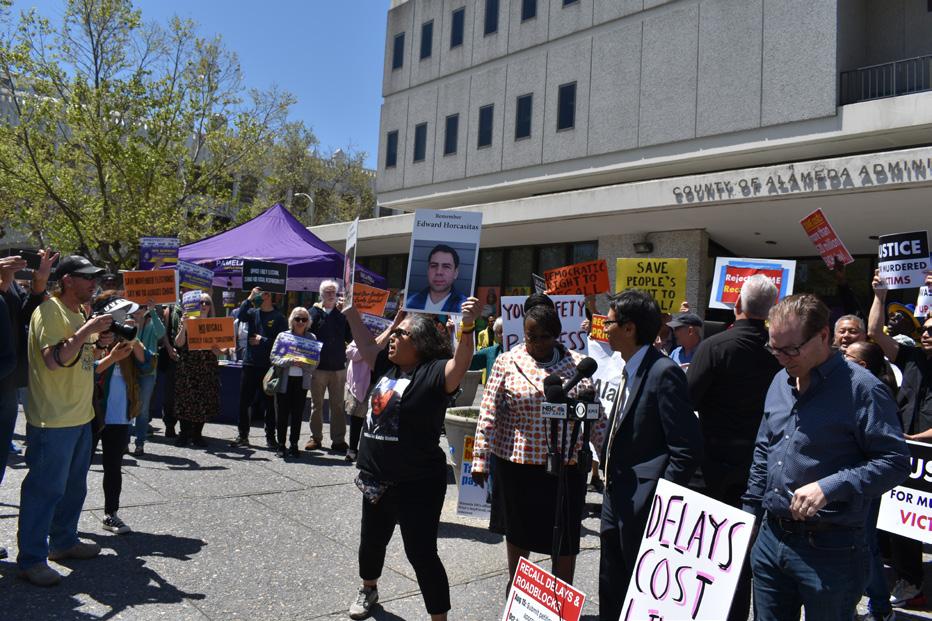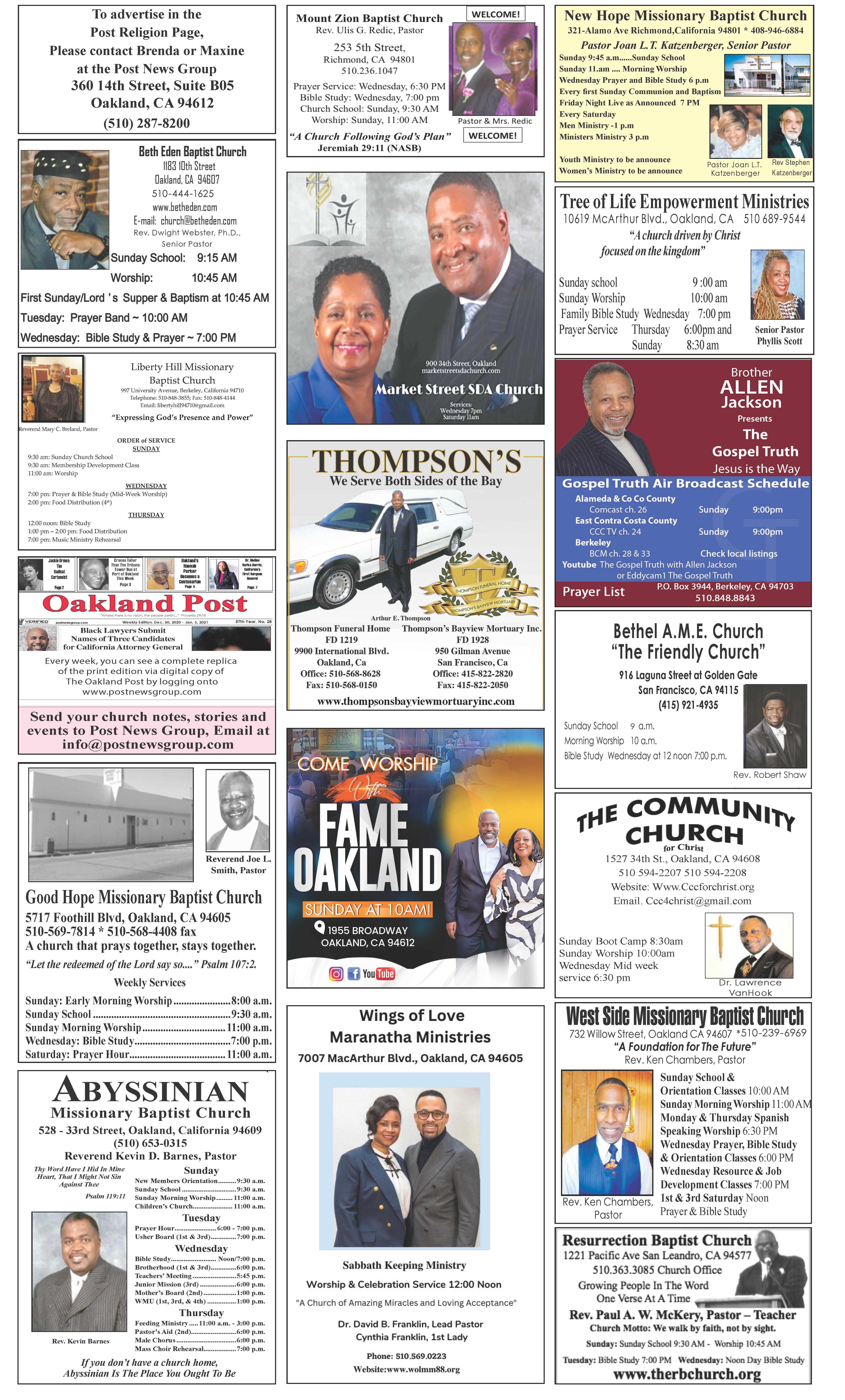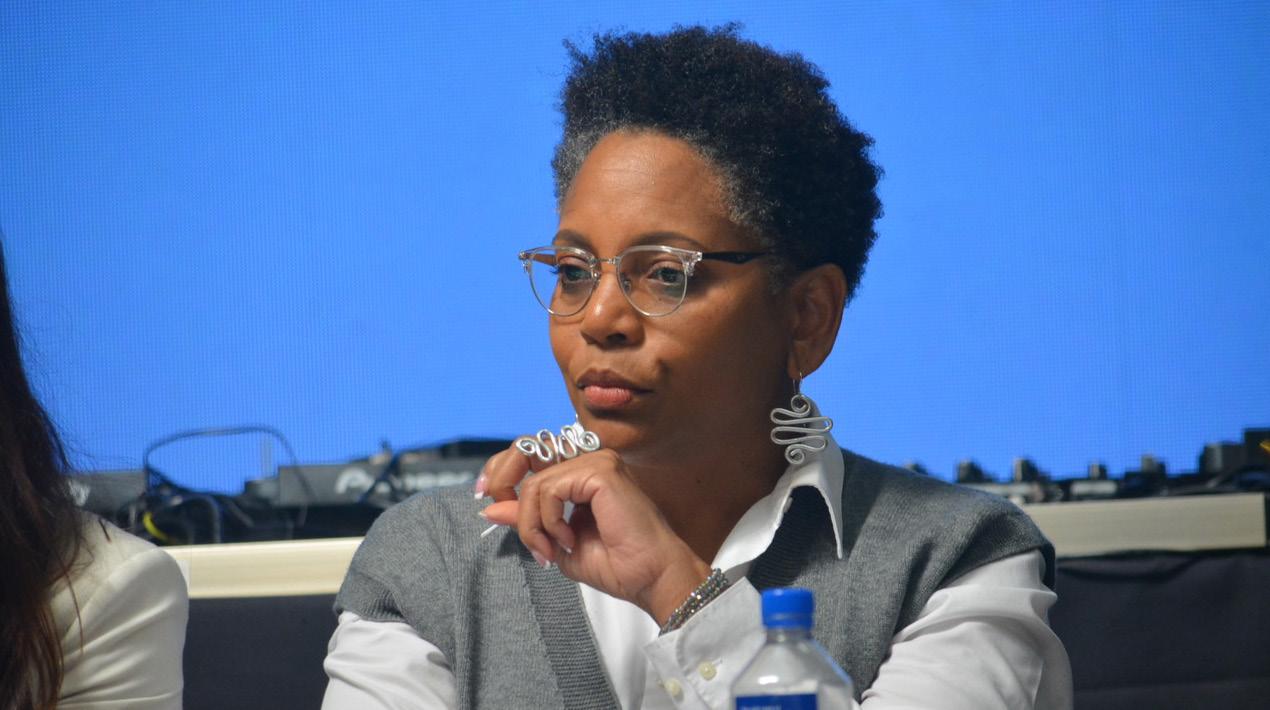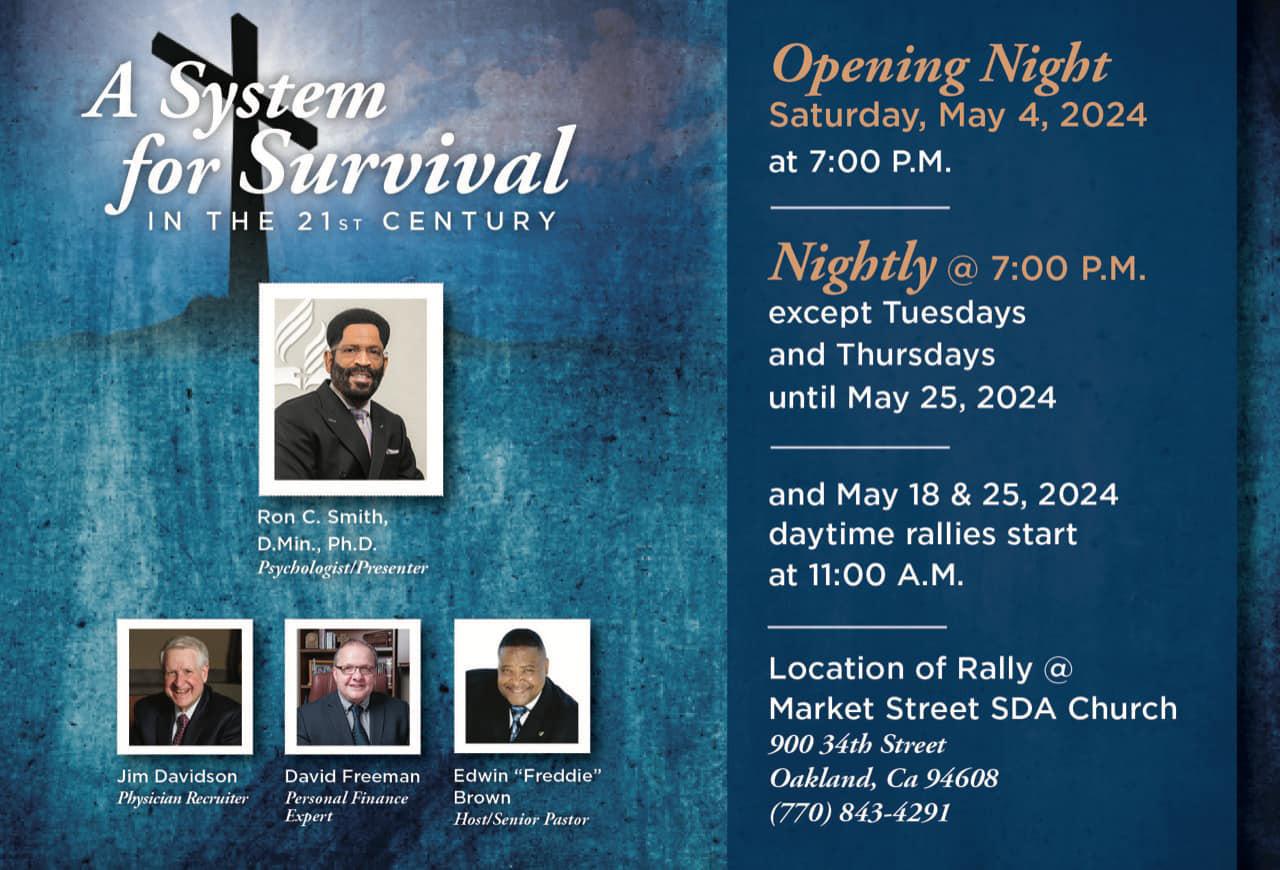








“Where there is no vision, the people perish...”




 By Magaly Muñoz
By Magaly Muñoz
The Alameda Board of Supervisors unanimously accepted the certification of the results of the valid signatures submitted for the recall of District Attorney Pamela Price on Tuesday evening. The Board will set the election date at a special meeting on May 14.
Before the meeting, recall proponents and opponents held separate press conferences to plead their cases to the Board and residents of Alameda County.
Price, who up until this point has made little public comment about the recall, held her press conference in Jack London to an-
 By Magaly Muñoz
By Magaly Muñoz
Hundreds of tents and abandoned vehicles now dot major streets and neighborhoods of the Bay Area. Unfortunately, this problem is expected to worsen as the housing market
skyrockets and the cost of living becomes unattainable for most Americans.
As one of California’s biggest public policy challenges, over the past four years, the state has allocat-

nounce that the California Fair Political Practices Commission has opened an investigation into the finances of the Save Alameda For Everyone (SAFE) recall campaign.
The political action committee (PAC), Reviving the Bay Area, has been the largest contributor to the
ed nearly $20 billion to housing and homelessness initiatives. Despite this substantial investment, the issue does not seem to be easing. Instead, the number of people without stable housing is surging.
A 2022 Point In Time (PIT) Count showed that there were 9,747 homeless individuals living on the streets in Alameda County, an almost 22% increase from the 2019 count of 8,022 homeless individuals. Many reports estimate that this number will rise once the 2024 data is released.
Amongst the many initiatives to end homelessness, the 2016 Senate Bill 1380 established California as a “housing first” state that would provide assistance, programs and funding to those experiencing homelessness. The bill recognized that the evidence-based model of prioritizing housing could end all types of homelessness and is the most effective approach to ending chronic homelessness.
In the years following the passage of the law, doctors, county officials and a community organization
photographer to inspire others. He wanted to learn as much as he could to be a supportive person for youth, so he enrolled at Laney College for the fall of 2020 for classes in Early Childhood Development.
He was killed when several people exited a 2020 silver Nissan Armada and shot him around 2 p.m. on April 28, 2020, on 68th Avenue in East Oakland. Police were able to recover the vehicle, which had been rented in Reno, Nev., but have been unable to solve the case.
Henry’s senseless murder continues to deeply impact his loved ones who are suffering from his loss.
“I hate the phrase passed away or died,” his mother says. “My son, Henry, was very protective of me, and we had a bond that could not be broken. I miss him so much.
“I hate April 28th because I feel Henry should be here, because he had a purpose helping others and
SAFE organization and has allegedly donated over half a million dollars to the recall efforts.
“Between September 2023 and November 2023, [Revive the Bay Area] donated approximately $578,000 to SAFE without complying with the laws that govern all political committees in Califor-
By California Black MediaCalifornia has failed to monitor state spending and evaluate the outcomes of homelessness programs, according to a report issued last week by the California State Auditor’s Office.
California State Auditor Grant Parks urged Governor Gavin Newsom to continue to hold local governments accountable in an open letter dated April 9. The audit highlighted that tracking programs and collecting accurate data could help the state save money.
“The state must do more to assess the cost-effectiveness of its homelessness programs,” Parks said.
The report showed that California spent approximately $20 billion on programs and initiatives addressing homelessness in the past five years. Although state funds were allocated to fund shelters and subsidized rent, homelessness in the state increased by 65 during the last year.
In 2021, Gov. Newsom signed a law that required organizations that received state funds to collect
By Post StaffOakland natives and esteemed members of the African American Sports and Entertainment Group (AASEG), Jonathan P. Jones and Dr. Maritony Efua Jones, recently embarked on a significant journey to Ghana as guests of the World Martial Authority Ghana.
This trip signifies a crucial opportunity to bolster partnerships, explore new avenues of collaboration, and contribute to impactful initiatives in Ghana.
Upon their arrival at Katota Airport in Accra, Ghana, the Joneses were warmly received by His Royal Majesty Okatakyie Asafo Boakye III, the distinguished king of Sanzule Kingdom in the Eastern Nzema, and Etse Nyamedi of World Martial Authority, Ghana.
Nyamedi accompanied the Joneses to the city of Mepe, which had recently experienced flooding, to assess damages and engage with local leaders, elders, and youth regarding the city’s urgent needs after major floods last fall.
Key concerns and priorities identified by the community in-
nia,” Price said.
Price accused the recall campaigns of using irregular signature-gathering processes, such as paying gatherers per signature, and using misleading information to get people to sign their petitions.
SAFE held their own press conference outside of the Alameda
County Administration Building at 1221 Oak St. in Oakland, once again calling for the Board to certify their signatures and set a date for the recall election. Their press conference turned contentious quickly as Price’s “Protect the Win” supporters at-

data and evaluate the progress of programs they implement.
California auditors revealed that only two out of five action plans were cost-effective. One was Project Homekey, which converted hotels into housing during COVID-19, and CalWORKS, a housing support that offered financial assistance to low-income residents.
Lawmakers on both sides of the aisle expressed concern after the report was released.
“The biggest conclusion that the auditors came back with is there’s just inadequate transparency and data and information available,” said Sen. Dave Cortese (D-San Jose) in a statement.
Republican Sen. Roger Niello (R-Roseville) said, “These audit results are a wake-up call for a shift towards solutions that prioritize self-sufficiency and costeffectiveness.”

clude comprehensive flood mitigation measures, agricultural support, housing initiatives, educational enhancements, improved healthcare access, and the development of communal recreational spaces.
The Joneses were also graciously invited to meet with leaders of The Church of Jesus Christ of Latter-day Saints at their headquarters in Accra. This meeting
provided insights into ongoing humanitarian efforts in Ghana and explored avenues for collaboration to further assist Ghanaian communities.
The LDS leaders shared their prompt response to the recent flood, demonstrating their commitment to humanitarian aid by dispatching substantial supplies including medical provisions,

Advocates from across California are challenging state officials and community leaders to support legislation that provides resources and services for survivors and victims of human trafficking, as well as assistance as they transition back into civil society.
Some of those advocates are also calling for more effective state policy to curtail trafficking, a crime that has an outsized impact on Black children, particularly girls.
According to the FBI, a report covering a two-year period found Black children accounted for 57% of all juvenile arrests for prostitution. In addition, 40% of sex trafficking victims were Black and 60% of those victims had been enrolled in the foster care system.
“It is time to hold the perpetrators who take advantage of our children accountable,” said the Rev. Shane Harris, a San Diego-based activist, former foster youth and founder of the Peoples Association of Justice Advocates, (PAJA), a national civil rights organization and policy think tank.
“It is time to send a thorough message that if you seek to buy a child for sex, you will pay the highest criminal penalties in this state,”
added Harris who was speaking at a rally at the State Capitol month.
Harris was speaking in support of Senate Bill 1414, authored by Sen. Shannon Grove (D-Bakersfield), which calls for people who buy sex from minors to be punished with a felony. The punishment includes a two-year prison sentence and a $25,000 fine.
Harris said PAJA is the only civil rights organization in the state that supports SB 1414.
Harris urged other Black-led groups who favor anti-trafficking legislation are more focused on criminal justice reforms (as opposed to stiffer penalties), to “join the movement.”
Many of those civil rights groups fear that SB 1414 could lead to the incarceration of more Black youth.
Those sentiments were echoed in a panel discussion organized by Black women advocates on April 26 to examine the cause and effects of human trafficking in California’s Black communities. The virtual event was hosted by the Forgotten Children, Inc, a faithbased nonprofit that advocates for survivors and victims of human trafficking through anti-trafficking campaigns and initiatives.
Panelists shared the psychological impact of sexual exploitation on youth and children in the

long term.
Author and educator Dr. Stephany Powell shared statistics and information revealing that African American women and girls are the most trafficked nationwide.
Powell, who serves as the senior advisor on law enforcement and policy at the National Center on Sexual Exploitation said that national data indicates that sex trade survivors are disproportionately women of color. She stated that male survivors often go unnoticed because boys rarely report trafficked crimes.
Powell said that decriminalizing prostitution in California could increase human trafficking. She argued that Senate Bill 357, authored by Sen. Scott Wiener (DSan Francisco), which was signed into law in 2022 and legalized loitering for prostitution, caused a surge in street-level prostitution.
Panelist and psychologist Dr. Gloria Morrow shared opposing views on decriminalizing prostitution. She said that decriminalizing prostitution could help survivors gain access to state resources and support.
Despite opposing views, Powell and Morrow agree that the Black community needs resources and educational programs to address human trafficking.


 By California Black Media
By California Black Media
State Superintendent of Public Instruction (SSPI) Tony Thurmond is advocating for comprehensive training for teachers in reading and math, emphasizing the urgent need to improve student academic outcomes across California.
On April 24, during testimony in the Senate Education Committee, Thurmond backed Senate Bill (SB)1115, which aims to provide evidence-backed educator train-
ing. The committee passed the bill with a 7-0 vote.
Thurmond pointed out to the committee that existing funding for educator training in literacy and math only covers about one-third of California’s educator workforce. SB 1115, Thurmond said, would fund the remaining two-thirds.
“This is an issue of moral clarity,” according to Thurmond. “In the fifth-largest economy in the world, and in an age when we have access to substantial brain science
about how students learn, it should be unacceptable to train only some educators in the best strategies to teach essential skills.”
SB 1115 incorporates multiple research-backed methods, including phonics, and it aligns with the California ELA/ELD Framework, which encourages biliteracy and multilingualism.
Thurmond emphasized the moral imperative behind the push for enhanced training by noting that 70% of incarcerated adults struggle with reading or are illiterate.
“Every child should feel supported as they learn to read and every teacher should feel confident in their ability to support students’ foundational literacy,” Thurmond said. “SB 1115 is about ensuring that all children have the opportunity to read by third grade, and that all children have a shot at the life-changing outcomes that come from early literacy.”
The next step for SB 1115 is a hearing in the Senate Appropriations Committee on May 6.
that local news outlets are a public good essential to preserving America’s democracy.
 By California Black Media
By California Black Media
Last week, California U.S. Senators Alex Padilla and Laphonza Butler, both Democrats, announced their support for a resolution that recognizes the significance of local news.

In the resolution dated April 23, Padilla and Butler joined Senator Brian Schatz (D-Hawai’i) and 10 other colleagues in designating April as “Preserving and Protecting Local News Month.”
The resolution acknowledges
“Millions of Americans count on the local news to help them understand what is happening in their neighborhoods and around the country. Yet local newsrooms have suffered from some of the harshest layoffs and budget cuts in recent years,” Butler said in a statement.
“It is critical that we recognize the role our local press plays in keeping people informed on the world around them,” she said.
The resolution comes at a crucial time in the media industry when employment decreased by 26% nationwide between 2008 and 2020, according to supporters of the bill. Employment in the newsroom came with great uncertainty as more than 30,000 jobs were lost in the last two decades. Sen. Schatz said that local news helps increase civic engagement and strengthens democratic norms and practices. This resolution will help local journalists maintain healthy and vibrant communities through valuable storytelling.














How the nation’s first College of Ethnic studies came about, bringing together Latino, African American and Asian American disciplines may offer some clues as to how to ease the current turmoil on American college campuses over the Israel-Hamas war.
After the deadline passed to end the Columbia University encampment by 2 p.m. Monday, student protesters blockaded and occupied Hamilton Hall in a symbolic move early Tuesday morning.
Protesters did the same in 1968.
That made me think of San Francisco State University, 1968.
The news was filled with call backs to practically every student protest the past six decades as arrests mounted into hundreds on nearly two dozen campuses around the country.
In 1970, the protests at Kent State were over the Vietnam War. Ohio National Guardsmen came in, opened fire, and killed four students.
Less than two weeks later that year, civil rights activists outside a dormitory at Jackson State were confronted by armed police. Two African American students were killed, 12 injured.
But again, I didn’t hear anyone mention San Francisco State University, 1968.
That protest addressed all the
issues of the day and more. The student strike at SFSU was against the Vietnam war.
That final goal was eventually achieved, but there was violence, sparked mostly by “outside agitators,” who were confronted by police.
“People used the term ‘off the pigs’ but it was more rally rhetoric than a call to action (to actually kill police),” said Daniel Phil Gonzales, who was one of the strikers in 1968.
Gonzales, known as the go-to resource amongst Filipino American scholars for decades, went on to teach at what was the positive outcome of the strike, San Francisco State University’s College of Ethnic Studies. It’s believed to be the first of its kind in the nation. Gonzales recently retired after more than 50 years as professor.
As for today’s protests, Gonzales is dismayed that the students have constantly dealt with charges of antisemitism.
“It stymies conversation and encourages further polarization and the possibility of violent confrontation,” he said. “You’re going to be labeled pro-Hamas or proterrorist.”
That’s happening now. But we forget we are dealing not with Hamas proxies. We are dealing with students.
Gonzales said that was a key lesson at SF State’s strike. The main coalition driving the strike
was aided by self-policing from inside of the movement. “That’s very difficult to maintain. Once you start this kind of activity, you don’t know who’s going to join,” he said.
Gonzales believes that in the current situation, there is a patch of humanity, common ground, where one can be both pro-Palestine and pro-Israel. He said it’s made difficult if you stand against the belligerent policies of Benjamin Netanyahu. In that case, you’re likely to be labeled antisemitic.
Despite that, Gonzales is in solidarity with the protesters and the people of Gaza, generally. Not Hamas. And he sees how most of the young people protesting are in shock at what he called the “duration of the absolute inhumane kind of persecution and prosecution of the Palestinians carried out by the Israeli government.”
As a survivor of campus protest decades ago, Gonzales offered some advice to the student protesters of 2024.
“You have to have a definable goal, but right now the path to that goal is unclear,” he said.
About the Author
Emil Guillermo is a journalist and commentator. A veteran newsman in TV and print, he is a former host of NPR’s “All Things Considered.”
ENGINEERING AND TRANSPORTATION DEPARTMENT
NOTICE TO BIDDERS FOR REHABILITATION PHASE FOR ANNUAL STREET PAVING 21-23
PROJECT NO. 2022.0050 | ID NO. 23-24.013
1. BID OPENING: The bidder shall complete the “Proposal to the City of San Leandro” form contained in the Contract Book. The proposal shall be submitted in its entirety. Incomplete proposals will be considered non-responsive. Sealed bids containing the completed Proposal Section subject to the conditions named herein and in the specifications for REHABILITATION PHASE FOR ANNUAL STREET PAVING 202123 addressed to the City of San Leandro will be received at City Hall, 835 East 14th Street, 2nd Floor San Leandro at the office of the City Clerk 3:00 p.m. on Thursday, May 23, 2024, at which time they will be publicly opened and read, at which time they will be publicly opened and read.
2. WORK DESCRIPTION: The work to be done consists of roadway paving, base cement stabilization, concrete sidewalks, curbs and gutters, traffic detection loops and pavement striping, and doing all appurtenant work in place and ready for use, all as shown on the plans and described in the specifications with the title indicated in Paragraph 1 above, and on file in the office of the City Engineer. Reference to said plans and specifications is hereby made for further particulars.
3. OBTAINING THE PROJECT PLANS AND CONTRACT BOOK: The project plans and Contract Book may be obtained free of charge from the City’s website at: https://www.sanleandro.org/Bids.aspx Bidders who download the plans are encouraged to contact the City of San Leandro Engineering and Transportation Department at 510577-3428 to be placed on the project planholder’s list to receive courtesy notifications of addenda and other project information. Project addenda, if any, will be posted on the website. A bidder who fails to address all project addenda in its proposal may be deemed non-responsive.
Printed hardcopies of the contract book can be purchased from East Bay Blue at: https://www.eastbayblueprint.com. Search the public projects planroom to find the subject project.
4. PRE-BID CONFERENCE: Two pre-bid video conferences will be held as follows: Tuesday, May 7th, 2024, at 2:00 p.m.
Zoom Meeting ID: 869 7754 7350, asscode: 711004
Zoom link: https://sanleandro-org.zoom.us/j/86977547350?pwd=WHkrOU81RUt3OVRL NHJFZzAzZXovUT09
And, Thursday, May 9, 2024, at 10:00 a.m.
Zoom Meeting ID: 885 2021 3734, Passcode: 572329
Zoom link: https://sanleandro-org.zoom.us/j/88520213734?pwd=aWQ2Z01YWGFsbGcz czE0ZzR0RVdsUT09
All bidders must attend at least one of the pre-bid conferences and be included on its attendance sheet. The information presented at each conference will be identical. A firm that didn’t attend a pre-bid conference isn’t qualified to bid on the project. Questions regarding the plans and specifications may be submitted in writing to the project engineer until 5:00 p.m. five (5) days before, excluding Saturdays, Sundays and Holidays, bids must be received by the City. The City will not respond to oral questions outside of the pre-bid conference. The response, if any, will be by written addendum only. Oral responses do not constitute a revision to these plans or specifications.
5. VALUE OF WORK: The Engineer has estimated that the value of work is between $2M-$3M.
6. SAN LEANDRO BUSINESS PREFERENCE AND PARTICIPATION GOALS: The work performed under this contract is subject to Section 1-6-225 of the San Leandro Municipal Code regarding local business preference and participation. A list of companies that hold a San Leandro business license is located on the City webpage under the finance department, here: https://www.sanleandro.org/340/Business-License
7. SAN LEANDRO COMMUNITY WORKFORCE AGREEMENT: The work performed under this contract is subject to the Community Workforce Agreement adopted by City Council Resolution 2015-104. Contractors attention is directed to Section 10.
Dated: April 26, 2024 | Kelly B. Clancy, City Clerk | 2256126.1



 By California Black Media
By California Black Media
Physician retention in California has decreased over the years for women doctors of color, a report by the Physicians for a Healthy California stated.
According to the report, women physicians are more likely to experience burnout than their male counterparts, a trend that worsened during the COVID-19 pandemic.
The report states that Black and
Latino physicians are underrepresented in the healthcare industry. Only 2.8% of physicians are Black and 5.5% are Latino across the state of California.
It also noted that women doctors of color are often assigned to serve in vulnerable and under-resourced communities.
“It is critical for health care organizations to implement effective strategies focused on the retention of this important group of clinicians,” the report stated.
Women doctors of color face career dissatisfaction, contributing to the low retention rates in California’s healthcare industry. The burnout particularly experienced by female doctors of color stems from workplace harassment and perceived lack of value at work.
Additionally, moral injury was another key factor driving women physicians of color away from the workforce. Unlike burnout, moral injury is defined as “the betrayal of what’s right by someone
who holds legitimate authority in a high-stakes situation.”
Currently, two of the nine California regions used in the framework of the report — the Inland Empire and San Joaquin Valley — have less than 50 primary care doctors. Physician shortages are projected to get worse over the next few years. By 2030, the report indicates, the demand for physicians will exceed the supply by at least 12%.

The Community Housing Working Group hosted a briefing on April 23 at Cafeteria 15L in Sacramento. Discussions focused on how the housing crisis in California affects Black and Brown communities and explored ways to provide low-income families and individuals with affordable housing.
Tia Boatman Patterson, CEO and president of the California Communities Reinvestment Corporation, said “entry-level housing” is not available as it was in the past, adding that affordable units were a major point of entry into homeownership for many families in the Black community.
“My mother bought her first house when I was in junior high. It was an 850-square foot, two-bedroom and one-bathroom house in 1978. That house cost $30,000,” Boatman-Patterson said.
“A woman working part-time at JCPenney was able to afford that house. We don’t build these types of housing now. We do not build entry-level homeownership,” she added.
The Community Housing Working Group is a collection of diverse community organizations from across California working together to address housing challenges in their communities. The organization believes that solving the affordable housing crisis will require creating enough smaller, lower-cost, multi-family homes located near jobs, transit, and good schools.
The briefing included a panel discussion titled, “Exclusionary Zoning: A Look Back and a Path Forward.” Boatman-Patterson participated in that session along with Henry “Hank” Levy, treasurer-tax collector for Alameda County, and Noerena Limón, consultant, Unidos U.S., and board member of California Housing Finance Agency.
Boatman-Patterson, a former associate director for Housing, Treasury and Commerce in the Office of Management and Budget for the Biden Administration, started her presentation by highlighting how exclusionary single-family zoning is contributing to continued segregation of California communities. She said that single-family zoning originated in the Bay Area city

of Berkeley in 1916.
“By creating single-family zoning and having fenced-off communities, you were able to exclude the ‘others,’” Boatman-Patterson said. “It really was a method to exclude — what they called ‘economic segregation’ — but that was a guise for racial segregation. Single-family zoning, along with redlining, became a systemic approach to exclude based on affordability.”
Title VIII of the federal Civil Rights Act of 1968 — commonly known as the Fair Housing Act of 1968 – is the U.S. federal legislation that protects individuals and families from discrimination in the sale, rental, and financing of housing. It was passed to open the doors to affordable housing.
In 1968, 65.9% of White families were homeowners, a rate that was 25% higher than the 41.1% of Black families that owned their homes, according to National Low-Income Housing Coalition. Today, those figures have hardly changed in the Black community, although White homeownership has increased five percentage points to 71.1%.
Boatman Patterson said the rate has not changed in Black and Brown communities because financing for affordable entry-level homes is almost nonexistent. The homeownership disparities contribute to the disturbing racial wealth gap in the nation, according to the National Low-Income Housing Coalition’s October 2018 report.
“We really must align the fi nancing with the actual building of units, which we haven’t neces sarily done. Because of this mis alignment, I think we continue to see problems,” Boatman-Patter son said.

Special to the Post Charter cities in California won a lawsuit last week against the state that declared Senate Bill (SB) 9, a pro-housing bill, unconstitutional.
Passed in 2021, SB 9 is also known as the California Housing Opportunity and More Efficiency Act (HOME). That law permits up to four residential units —- counting individual units of duplexes, triplexes and residential dwelling units (RDUs) – to be built on properties in neighborhoods that were previously zoned for only singlefamily homes.
A Los Angeles Superior Court
Judge ruled in favor of the cities, pointing out that SB 9 discredited charter cities that were granted jurisdiction to create new governance systems and enact policy reforms. The court ruling affects 121 charter cities that have local constitutions.
Attorney Pam Lee represented five Southern California cities in the lawsuit against the state and Attorney General Rob Bonta.
“This is a monumental victory for all charter cities in California,” Lee said.
However, general law cities are excluded from the court ruling as
 By Tamara Shiloh
By Tamara Shiloh
Imagine you’re only 22 years old and already making a name for yourself in NASCAR, one of the most thrilling sports in the US.
That is the life of Rajah Kirby Caruth, an American professional stock car racing driver.
Born June 11, 2002, in Washington, DC, he was drawn to the sport as a child after seeing the Disney Pixar film “Cars.”
Caruth dreamed of tooling around the track like the main character in “Cars,” Lightning McQueen. His enthusiasm grew when his parents surprised him with a trip to the NASCAR Cup Series race at Richmond Raceway
when he was 12.
In 2018, while keeping busy with school, sports and a summer job, Caruth and his family held fundraisers so that he could buy an iRacing simulator. Then, at age 16, he traded a real driver’s license to race virtually in the eNASCAR Ignite Series, which led to him being recruited by the NASCAR Drive for Diversity Program.
His first big opportunity came in 2019 when he competed in a “Legends” car at Charlotte Motor Speedway in the Bojangles’ Southern Shootout and recorded two top-third in the semi-pro points.
People began to recognize Caruth’s talents. In 2020, he stepped
up to the NASCAR Advance Auto Parts Weekly Series and became the first African American to win at Greenville-Pickens Speedway in a late model race. The next year, he won at Tri-County Motor Speedway and picked up his fourth overall late model victory.
Then, he became the first person of color to win at the South Carolina track.
In 2021, Caruth announced he would compete full-time in the ARCA Menards Series East for Rev Racing, where he finished third in the standings, including a series of top-five finishes. He made his NASCAR Xfinity Series debut on a bigger stage as well. Then, in 2022, thing really took off. A new chapter found Caruth at NASCAR’s unofficial Triple A league with GMS Racing, where he drives full-time for the NASCAR Camping World Truck Series, with a sponsorship from The Wendell Scott Foundation. After a few setbacks, he broke into the top 10 several times, finishing at a career-high 6th at Darlington Raceway.
Fast-forward to 2024, and Caruth’s took the third major step in his career. He is now driving fulltime in the NASCAR Craftsman Truck Series for Spire Motorsports and has been making the news for putting on stellar performances. Oh, and he won at Las Vegas: his first career victory.
From an impressionable young racing fan to a professional NASCAR driver, Caruth is charting a new path, creating history, and inspiring people to always remember that if you have the talent, the drive, and most of all, the heart, anything can be achieved.

state housing laws still apply in residential areas.
Attorney General Bonta and his team are working to review the decision and consider all options that will protect SB 9 as a state law. Bonta said the law has helped provide affordable housing for residents in California.
“Our statewide housing shortage and affordability crisis requires collaboration, innovation, and a good faith effort by local governments to increase the housing supply,” Bonta said.
“SB 9 is an important tool in this effort, and we’re going to make sure homeowners have the opportunity to utilize it,” he said.
Charter cities remain adamant that the state should refrain from making land-use decisions on their behalf. In the lawsuit, city representatives argued that SB 9 eliminates local authority to create single-family zoning districts and approve housing developments.


 Sponsored by JPMorgan Chase & Co.
Sponsored by JPMorgan Chase & Co.
In a world of online tools that let you make banking transactions with the touch of a button, the idea of visiting a branch might seem unnecessary.
However, if you haven’t visited your local branch recently, you might be surprised by what it has to offer. Your branch is much more than a place to deposit and withdraw money – it can offer the opportunity to build valuable relationships with people who can help you achieve financial independence.
Diedra Porché, Head of Community and Business Development at Chase, talks about how the bank model has evolved to maximize the branch experience for customers; how connecting with your local branch team can help

Cinco De Mayo: Five Interesting Facts You Should Know About the Popular Mexican American HolidayBy Edward Henderson California Black Media
To explore the historical significance of Cinco De Mayo, we step back to the origins of the commemoration, share how some Mexican American Californians regard it and trace how it has morphed into the celebrations we see today.
Celebrations in the United States began in 1862 in Columbia, California, a small town located in the foothills of the Sierra Nevada in Tolumne County, according to that town’s website.
Today, millions of Americans celebrate Cinco De Mayo annually with 120 official celebrations organized across the United States.
This day has become a cultural point of pride for Mexican Americans and other Latino communities in the United States. It serves as a time to affirm and celebrate their cultures with other Americans of all backgrounds as they highlight their contributions to American history and society.
Joseph Soltero, a Mexican American living in Escondido, shared his perspective on Cinco de Mayo with California Black Media. He learned about Cinco de Mayo from his grandfather and talked about the extent to which his family and San Diego County community celebrate the holiday.
“We knew September 16 was really Mexican Independence Day, but kids in my school would always mistake Cinco de Mayo as our Independence Day. [Cinco de
Mayo] is not really even a Mexican holiday,” said Soltero. “It’s something people do to have an excuse to buy drinks, have fun and spend a little money at taco shops.”
Like Soltero, many Mexican Americans (and other Latino Californians) do not take the support and solidarity they receive from people of other races on Cinco de Mayo for granted. They also appreciate when people take the time to learn about the cultural significance of the day and avoid some of the cultural tropes that can easily whisper undertones of racism.
To help raise your awareness about the origins and cultural significance of the day, here are five little known facts about Cinco de Mayo:
1. Cinco de Mayo is not Mexican Independence Day. It is the anniversary of the Battle of Puebla. This military victory on May 5, 1862, over the French forces of Napoleon III was hailed as a symbol for Mexican resistance to foreign influence.
2. The holiday was not given much historical significance outside of Puebla, and it has not been celebrated on a large scale in Mexico. However, during the Civil War, Mexican Americans in California, Oregon and Nevada who supported the Union drew inspiration from the victory over the Frenchbacked Confederate forces.
3. The Chicano civil rights movement in the 1940s gave a new
you think differently about money and investing for your future.
How can a customer feel connected to a bank branch?
I love that question because we ask ourselves the same thing every day. Being part of the community means meeting with local leaders to find out what they need from us and then designing our branches around that. For example, at some of our community branches we have what we call a living room where we can host financial workshops, small business pop-up shops or nonprofit organization meetings. We also hire locally. You feel much more connected talking about financial aspirations with people from your community who went to the same high school, place of worship or maybe frequented the same recreation center down the street when they grew up.
How can I build a relationship with my bank?
Customers should feel comfortable sharing their goals, needs and wants with their banker. Also, it helps to remember the Community Manager is there to help solve your finance challenges and build a roadmap for success. You might have a short-term or longterm goal to open a business, build your credit, become debt-free, buy a home, or save for retirement, and our community team can help. At Chase, we strive to make dreams
possible for everyone, everywhere, every day. Your financial future starts with building those relationships.
How can customers change negative perceptions they have about managing their money?
Far too often, customers are intimidated when they visit a bank. Our goal is to demystify banking and money myths empowering people to make the right decisions. For example, a big myth is assuming you need a lot of money to have a bank account. You don’t! Another myth is you need to carry a balance on your credit card to build credit — actively using your credit card can demonstrate that you can use credit responsibly but carrying a balance won’t necessarily improve your credit score. Finally, understanding mobile and online banking safety is key. There are so many safeguards and protections in place to guard your personal information and funds.
What’s an easy step one can take to shift their financial behavior right now?
Cultivating self-awareness is a good first step. Start by taking inventory of your spending. Be honest with yourself about what you need and what you want. Too often, people confuse the two, which leads to bad decisions. Rent is something you need to pay. An extra pair of shoes is something you may want but before you buy them
ask yourself if that’s the best use of your hard-earned money. Too often, our beliefs and our fears shape our financial realities. If any of those beliefs are limiting your financial behavior, it’s important to question and examine them, and then decide you’re open to learning something different.
What’s one perception about banking that you’d like to change?
I think folks are surprised there are so many resources available and accessible both at our branches and online, it’s always a good idea to visit a nearby branch and speak to a Community Manager or banker. Outside of what we offer in-branch, our teams also work with local neighborhood partners who provide a variety of services to support the community, businesses and residents. I received a unique piece of feedback from an employee who started with the bank and had lived in the same community his whole life. When he visited his local community branch, he said, “Diedra, when I walked in, I felt dignified.” Every time I recount that story, it warms my heart because that’s what we want — we want our centers to belong to the community.
energy to celebration of the holiday in the United Sates as a symbol of national pride.
4. In the 1980s and 1990s, beer companies’ marketing strategies targeted Mexican Americans by encouraging them to celebrate their heritage – and Cinco De Mayo —with Coronas, Bud Light, and Dos Equis. This created the perceived connection between Cinco de Mayo, alcohol, and merrymaking.
5. Los Angeles hosts the largest Cinco de Mayo celebration in the country.
As we join Mexican American Californians to celebrate Cinco de Mayo next week, let’s deepen our cultural understanding.
Let’s use this occasion to commit to learning more about our neighbors, colleagues and friends of other races and ethnicities.
This resource is supported in whole or in part by funding provided by the State of California, administered by the California State Library in partnership with the California Department of Social Services and the California Commission on Asian and Pacific Islander American Affairs as part of the Stop the Hate program.
To report a hate incident or hate crime and get support, go to CA vs Hate.
 By Post Staff
By Post Staff
I recently came across an author who has had an incredible writing career. Percival Everett is a contemporary American author whose literary prowess and creative ingenuity have captivated readers and scholars alike. From his early beginnings to his groundbreaking contributions, let’s dive into the life and career of this extraordinary individual.
Born on December 22, 1956, in Fort Gordon, Georgia, Percival Everett grew up in a family that valued education and intellectual pursuit. His father, a dentist, and his mother, a teacher, instilled in him a deep appreciation for learning and creativity from an early age. Everett’s upbringing in the segregated South deeply influenced his perspective and later influenced his literary works, which often explore themes of identity, race, and society.
His passion for literature and writing led him to pursue higher education. He earned his undergraduate degree in philosophy from the University of Miami and later obtained a Master of Fine Arts in creative writing from Brown University.
Percival’s literary career is characterized by versatility, inno-
vation, and a fearless exploration of various genres and styles. He has authored over 30 books, including novels, poetry collections, and essay collections, each demonstrating his mastery of language and narrative craft.
One of Percival’s most acclaimed works is “Erasure,” a satirical novel that critiques the publishing industry and societal perceptions of race. The novel’s protagonist, Thelonious “Monk” Ellison, navigates the complexities of identity and authenticity in a world that often reduces individuals to stereotypes. “Erasure” challenges readers to confront uncomfortable truths about race and representation while showcasing Everett’s sharp wit and incisive commentary.
In addition to his literary achievements, he is also known for his innovative approach to storytelling. He experiments with form, structure, and language, pushing the boundaries of conventional narrative techniques. His novel “Glyph,” for example, features a protagonist who communicates through symbols rather than words, inviting readers to decipher the narrative’s intricate layers.
Apart from his novels, he has also made significant contributions to the field of literary criti-
cism and theory. His essays and scholarly works explore a wide range of topics, from postmodernism to the philosophy of language, enriching academic discourse and inspiring future generations of scholars.
Along with being an exceptional writer, he is also an accomplished musician, painter, and inventor, demonstrating a remarkable ability to merge creativity with innovation.
One of Everett’s notable inventions is the “Zulus,” a type of writing implement designed to facilitate communication for individuals with disabilities. Inspired by his brother’s struggle with cerebral palsy, Everett sought to create a tool that would empower individuals with limited mobility to express themselves more easily. The “Zulus” exemplifies Everett’s commitment to using his creative talents for social good, embodying his belief in the power of art to effect positive change.
His book, Erasure, was also the inspiration for Emmy-winning “Watchmen” TV writer Cord Jefferson’s first feature film American Fiction.
He now lives in Los Angeles, California with his wife, the novelist, Danzy Senna, and their two children.
Diedra Porché, national head of Community Banking, JPMorgan Case & Co. Shutterstock. Percival Everett. Courtesy photo. By California Black Media
By California Black Media
Delaine Eastin, who served as a former state Assemblymember representing parts of Santa Clara and Alameda County — and the first woman elected as State Superintendent of Public Instruction — died at age 76 on April 23.
Eastin passed away from complications caused by a stroke.
Known for her power of persuasion, Eastin used her influence to be a champion for bipartisan issues that helped raise academic standards, lower class sizes, and emphasize the importance of conserving nature and the environment in schools.
Former Assembly Speaker Willie Brown and fellow legislative colleagues said that Eastin was in demand on the speech circuit while serving as a legislator.
“Few could engender the kind
of emotion and passion she delivered in every speech,” Brown said.
State superintendent Tony Thurmond called Eastin a trailblazer who inspired fellow public servants.
“California lost an icon in our school system today. Delaine Eastin’s legacy as a trailblazer in public education will forever inspire us. Her unwavering dedication to California students — from championing Universal Preschool and the “A Garden in Every School” program to honoring our educators by establishing the California Teachers of the Year Awards — has left an indelible mark on our state’s educational landscape,” said Thurmond.
Thurmond honored Eastin’s legacy at the California Teacher of the Year Program, an honor that she established during her time as superintendent.


 By California Black Media
By California Black Media
Gov. Gavin Newsom and Attorney General Rob Bonta announced last week that they are backing a bill introduced by the state legislative women’s caucus that would allow Arizona-based doctors to provide abortion care in California to patients from Arizona.
Senate Bill (SB) 233 was authored in response to the Arizona Supreme Court’s decision on April 9 that an 1864 ban on abortion in the state is enforceable. The bill also aims to counter growing support for anti-abortion legislation in states with Republican-majority legislatures since Roe v. Wade was overturned, according to supporters.
“California will not sit idly by.
We’re urgently moving legislation to allow Arizona doctors to provide safe and reliable reproductive care to Arizonans here in California,” Newsom said.
Sen. Nancy Skinner (D-Berkeley), chair of the California Legislative Women’s Caucus said that abortion bans are based on laws that set women back to a time when they had limited human rights.
“Anti-abortion forces have resurrected a dead law passed at a time when women couldn’t vote and husbands beating their wives was lawful,” Skinner said.
On April 24, the Arizona House of Representatives voted to repeal the 1864 abortion ban. It now moves to the Arizona Senate for deliberation.

came together to create a first of its kind shelter to combat homelessness with housing and healthcare: the Oak Days shelter. Located in the Hegenberger corridor of Oakland, this facility, once a Days Hotel, now houses 60 individuals, some who are medically fragile.
As local counties navigated how to isolate people during the start of the COVID-19 pandemic in 2020, the state obtained federal funding to begin Project Roomkey, an initiative providing non-congregate shelter options, such as hotels and motels for people experiencing homelessness, to protect life and minimize strain on the healthcare system.
Dr. Alexis Chettiar, a medical director in Alameda County, witnessed firsthand how the coronavirus disease took over the lives of the most vulnerable populations who were too sick to remain stable unless they had hands-on supportive health care and permanent housing.
She also noticed a trend of medically vulnerable individuals with psychiatric illnesses or substance abuse issues being expelled from nursing homes, often ending up in encampments or unsheltered conditions.
This observation would inspire her, along with fellow medical director Catherine Hayes, to start Cardea Health, supported by county funding.
“What we really wanted to do was to be able to layer on the medical services to a permanent supportive housing environment so that people could age in place, they could stay there, no matter how their care needs change over time. They could stay there through the end of their life,” Chettiar said.
Cardea Health provides medical and personal care for almost 60 patients across two sites. One of these sites is an Old Comfort Inn that was also transformed into a shelter for
those experiencing homelessness and chronic illnesses. The medical team assists with tasks such as injecting insulin, administering dialysis, helping patients use the restroom or get dressed.
Chettiar shared that she’s seen people as young as 40 years old with health-related issues mimicking that of an 80-year-old. Some individuals had untreated wounds that led to infections or chronic illnesses that went untreated for years, leading to immense suffering before they were able to receive medical attention.
The harsh conditions of living on the streets have exacerbated what could’ve been manageable situations, into a full-blown health crisis that ultimately put them on the priority list for Cardea’s health assistance.
UCSF Benioff Homelessness and Housing Initiative conducted a survey of 3,200 people to study who is experiencing homelessness, how they became homeless, what their experiences are and what is preventing them from exiting homelessness.
Data from those surveys showed that 45% of those experiencing homelessness reported poor or fair health and 60% reported having a chronic illness. Participants also reported that being homeless worsened their physical and mental health.
Of those experiencing health problems, 23% couldn’t access necessary healthcare in the prior six months. Additionally, 38% visited emergency departments without hospitalization and 21% reported a hospitalization for a physical health concern.
Chettiar stated that the work at Cardea is intended to reduce hospital visits for those living on the streets, providing essential care where it’s needed most.
tempted to yell over the SAFE staff and volunteers. “Stop scapegoating Price” and “Recall Price” chants went on for several moments at a time during this event.
Families of victims urged the Board to think of their loved ones whose lives are worth much more than the millions of dollars that many opponents of the recall say is too much to spend on a special election.
The Registrar of Voters (ROV) estimates the special election could cost anywhere from $15 to $20 million, an amount that is not in their budget.
The Board was presented with several options on when and how to conduct the recall election. They have to set a date no less than 88 days or more than 125 days after May 14, meaning the date could fall anywhere from late July to September.
But the County charter also states that if a general election takes place within 180 days of their scheduling deadline, the Board could choose to use the November ballot as a way to consolidate the two events.
In the event that Price is recalled, the Supervisors would appoint someone to fill the vacancy, though neither the County nor the California charter specifies how long they would have to pick a replacement.
The appointee would serve
as district attorney spot until the next election in 2026. Afterwards, either they, if they run and win, or a newly elected candidate would serve the rest of Price’s six-year term until 2029. Price is unique as the only district attorney wo serves a term of six years.
The Board acknowledged that they knew last fall that this recall would come with its own set of complications when Measure B, which changed the local recall charter to match California’s, was first brought to their consideration.
Supervisors Nate Miley and David Haubert opposed discussing the measure, stating that the public would think that the Board was attempting to influence the recall campaign that had already taken off months prior.
“I think ultimately this feels like it’s going to end up in court, one way or the other, depending on who files what,” Haubert said.
Price’s legal team told the Post that the district attorney intended to consider all legal options should the recall election take place.
Miley stated that while he was in support of the amendment to the charter, he did not think it was right to schedule it for the March ballot as it would ultimately cause confusion for everyone involved.
“It has produced some legal entanglements that I think, potentially, could’ve been avoided,” Miley said.
‘Outlaw
 By Carla Thomas
By Carla Thomas
The Oakland International Film Festival hosted a screening of “Outlaw Posse” at the Grand Lake Theatre on Monday. Special guests included director/actor Mario Van Peebles and his co-star, Oakland native Scytorya Rhodes. The film is Peebles’ second western, the first being ‘Posse,’ 13 years ago. Filmmaker Van
Peebles shared his passion for independent artistry and producing projects with his son, Mandela, who also starred in the film, along with Whoopi Goldberg and Cedric the Entertainer. Next week, The Post will publish an in-depth interview featuring Peebles’ reflections on his work, future projects, and continuing his father’s legacy and Rhodes on her grandfather, a real-life cowboy.
 By Post Staff
By Post Staff
Zefer O’Neal Ward transitioned from this life on Feb. 19. She was 105 years old. A native of Pine Bluff, Arkansas, Zefer was the sixth of George and Zora O’Neal’s 14 children. Her joy of singing began at home at the tender age of 4 by being placed on a table and being asked to sing a song. By age 13, she was a member and directress of the youth choir at St. Paul Baptist Church. Zefer attended Merrill High School and Arkansas State College in Pine Bluff, Arkansas.
In 1945, Zefer made her home in Oakland, California, where she established deep roots. It was in 1950 that she married the late William “Bill” Ward. That same year, she joined Downs Memorial Methodist Church under the esteemed leadership of Rev. Roy C. Nichols, where her angelic voice soon became a cornerstone of the church’s 8:30 a.m. worship service.
She went on to lend her voice and talents to various choirs in the church including the gospel choir and the formulation of the children’s choir under the guidance of the late Rev. Amos Cambric Jr. Zefer’s gift of song extended far beyond the walls of her church. For decades, she brought solace and in-
working with youth. He was physically strong and had a plan, goals, and dreams. Henry had a smile that would light up the room. He is a wonderful son, brother, and uncle.”
“Instead of imploring you for information and help, I should be telling you about all the things he has achieved and all the people that he touched,” his mother said.
“But instead, here I am praying for justice because a person who would take the shirt off his back for others was murdered.
“There is no word to describe this everyday pain for me. I expect him to text me at any moment because his favorite saying was
“don’t say bye, say see you later.”
It’s four years later and I can’t physically hold him,” his mother comcluded.
The Family Support Advocates join with Henry Texada’s grieving family and loved ones in their pursuit of justice. Anyone in the community with information


spiration to countless souls through her performances at funerals, weddings, concerts, conventions and church programs throughout the Bay Area.
Her unparalleled artistry even graced the ears of the late Robert F. Kennedy during a performance at the University of California, Berkeley. To quote her, “I have been involved with singing all my life. Singing is a joy for me. Every time I sing, I pray that I will bring joy to someone. I know that the Lord has used me to touch and bless someone ... singing is my life, my joy.”
Surviving Zefer are her two children; Norma Ward-Sledge, CEO and co-founder of Progressive Transitions, Inc. a program in Oakland that has become a beacon of hope for women and families affected by domestic violence and human trafficking; and William Wilson, of Raleigh, North Carolina, a retired business owner. She also leaves behind her sister Minnie O’Neal of Dupont, Washington, two grandsons both of Raleigh, North Carolina and a host of nieces and nephews.
In lieu of flowers, the family kindly requests contributions be made to Progressive Transitions, Inc., an organization that Zefer passionately supported.
There will be a “Memorial Tribute to Zefer” at 11 a.m. on Saturday, June 1 at Downs Memorial United Methodist Church, 6026 Idaho St. in Oakland.
A follow-up event, “Celebrating the Legacy of Lady Z,” will be held on June 22 at Z Café, 2735 Broadway Oakland at 2 p.m. Please RSVP for this event via text or call (510) 917-0666.
about Henry’s murder is asked to contact the Homicide Section of the Oakland Police Department at (510) 238-3821 or the TIP LINE at (510) 238-7950. CrimeStoppers of Oakland is offering a reward for an arrest in this case. #JusticeforHenry.
FAMILY SUPPORT ADVOCACY TASK FORCE
The mission of the Family Support Advocacy Task Force, a committee of the Violence Prevention Coalition, is to advocate for local, state and federal policies and legislation to enhance and expand support to families and friends of those who experienced violence; for more compassionate and transparent communication between law enforcement, the district attorney with the family of homicide victims and to push for the elimination of all violence, but particularly gun violence and homicides.
sanitation items, blankets, and food to assist flood victims just four days after the disaster.
Additionally, Boakye extended a special invitation to the Joneses to his palace, where they were pleasantly surprised with a heartfelt recognition ceremony. Maritony Jones was honored as the Queen Mother of the Sanzule Kingdom in acknowledgment of her dedicated work, while Jonathan Jones was lauded and welcomed as the ambassador of the Sanzule Kingdom, symbolizing a meaningful homecoming to their ancestral land.
The visit not only strengthens ties between Oakland and Ghana but also underscores the collaborative spirit and commitment to meaningful progress and humanitarian endeavors shared by all involved parties.